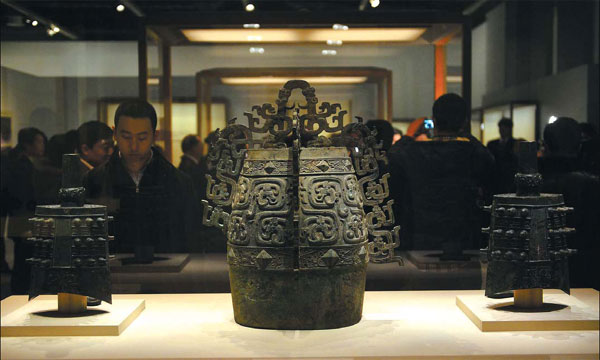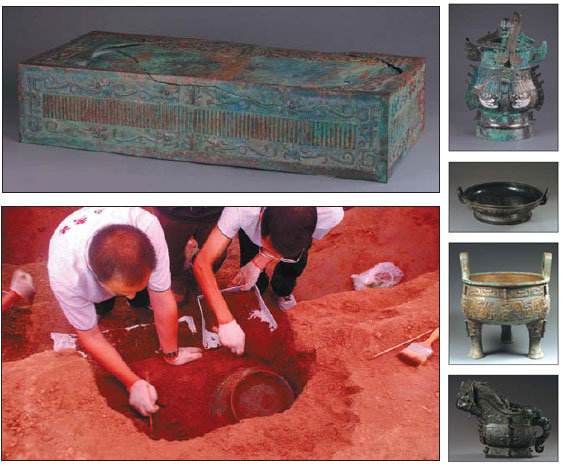Cast in bronze
Updated: 2013-03-14 07:44
By Wang Kaihao (China Daily)
|
||||||||
|
Visitors are fascinated by bronze ware displayed at the Watching and Guarding Home Exhibition, at the National Museum of China. Jiang Dong / China Daily |
The communities of Baoji are forever linked with China's ancient metallurgy. Wang Kaihao reports on the pride and the preservation.
For residents in Baoji, Shaanxi province, also known as "the hometown of bronze ware", protecting historical treasures is one way to safeguard their homeland. At least, that is what they want to express through a compelling exhibition at the National Museum of China in Beijing.
The one-month free exhibition Watching and Guarding Home continues through March 31. It includes 156 bronze artifacts ranging from sacrificial vessels to musical instruments, all accidentally discovered by Baoji's residents since 1975.
"It's not too exaggerated to say these are national treasures," says Yan Zhi, the museum archaeologist and also the curator of this exhibition.
Yan says that among the exhibits, 62 items have been appraised as national grade-one artifacts and 76 are still waiting to be graded. He estimates two-thirds of the exhibits will be top-graded national treasures.
"And it is not often that our museum is able to exhibit such a huge number of rare antiques, and all of them were discovered by local villagers."
Baoji was the birthplace of Western Zhou Dynasty (c. 11th century-771 BC) and a major cultural hub in the following centuries. Innumerable items of bronze ware, symbolic ancient Chinese artifacts, have been unearthed in the area. Yan says 90 percent of the nation's bronze ware carved with long inscriptions was found around Baoji.
Yan adds this is also the first time that more than 100 bronze artifacts from Baoji has ever been assembled outside of Shaanxi province.
One third of the items in the current exhibition were just discovered last year.
"My neighbors were building a new cabin and has dug a hole which was about 8 to 9 meters deep," recalls villager Xu Haijun from Shizuitou village, Shigu town in Baoji, who accidentally uncovered some of the treasures last June.
Xu attributes his discovery to his curiosity. "I stood by and watched for a few minutes," says the 30-year-old, who works at a pumping station. He suddenly heard a clink, and shouted at the workers to stop because he thought the water pipe had been broken. However, when the earth was cleaned, the workers found that their tools had hit bronzes. Xu immediately reported the situation to local authorities.
The find is not an everyday occurrence, he says. "I only heard about one neighbor once finding a relic at the field many years ago. Don't misunderstand we can easily find treasures because we lie on them," he says, giggling.
"But when more villagers build new houses and excavate deeper foundations, I guess more relics will be found."
Archaeologists unearthed a rare item called jin, of the Western Zhou Dynasty, in the hole. It was the first time after the founding of the People's Republic of China in 1949 that this coffee table-shaped artifact was discovered, and so it has become a highlight of the Beijing's exhibition.
According to Yang Hongbin, deputy director of Baoji municipal cultural relics bureau, only five pieces of jin were ever found, all in Baoji. Two others are also being exhibited, one in the Tianjin Museum and the other in New York's Metropolitan Museum of Art.
Jin means "to forbid" in Chinese. It is said the king promoted it to remind the aristocrats to control themselves because the previous dynasty, the Shang (c. 16th century-11th century BC) declined largely due to its last king's dissipated life, especially his excessive drinking.
The jin on the exhibition is 94.5 cm long, 45 cm wide, and 20.5 cm tall, weighing about 42 kg. Academics have not reached a consensus to explain why the jin is so rare. One likely reason: this huge piece has to be cast as a whole, with a highly demanding technique.
"Maybe the other explanation is that only the people here are so obedient in making the items while other places didn't follow the king's guidance," Yang jokes.
More than 10 villagers at Shigu found bronze ware in 2012. Each of them, including Xu, got 5,000 to 15,000 yuan ($804-2,400) as a reward. This led to the discovery of the tomb of an early Western Zhou Dynasty aristocrat, which has been the last decade's most important archaeological discovery in Baoji.
In the past decade, Yang says, the government has spent at least half a million yuan to reward locals who contribute to the protection of historical relics, after 25 important findings were reported.
Since 2003, the city has been pointed out as one of the finest examples on the protection of historical relics. While the government actively promotes relevant national laws in rural communities, Yang confesses there still are some cases of tomb raiding every year. Baoji police authority arrested 101 grave-robbery suspects in 2012 and recovered 438 pieces of stolen antiques.
"It is a must to simultaneously stop the crimes and better educate the people," Yang says proudly. "Fortunately, people in Baoji are nice.
"As we live on this land, we cannot let its tangible history die away."
Contact the writer at wangkaihao@chinadaily.com.cn.
|
Clockwise from top left: Jin and four other bronze ware items from Baoji are some of the exhibition's highlights. Archaeologists unearth bronze ware from a relic site in Baoji. Photo provided to China Daily |
(China Daily 03/14/2013 page18)

 In Photos: 7.0-magnitude quake hits Sichuan
In Photos: 7.0-magnitude quake hits Sichuan
 Li Na on Time cover, makes influential 100 list
Li Na on Time cover, makes influential 100 list
 FBI releases photos of 2 Boston bombings suspects
FBI releases photos of 2 Boston bombings suspects
 World's wackiest hairstyles
World's wackiest hairstyles
 Sandstorms strike Northwest China
Sandstorms strike Northwest China
 Never-seen photos of Madonna on display
Never-seen photos of Madonna on display
 H7N9 outbreak linked to waterfowl migration
H7N9 outbreak linked to waterfowl migration
 Dozens feared dead in Texas plant blast
Dozens feared dead in Texas plant blast
Most Viewed
Editor's Picks

|

|

|

|

|

|
Today's Top News
Live report: 7.0-magnitude quake hits Sichuan, heavy casualties feared
Boston suspect cornered on boat
Cross-talk artist helps to spread the word
'Green' awareness levels drop in Beijing
Palace Museum spruces up
First couple on Time's list of most influential
H7N9 flu transmission studied
Trading channels 'need to broaden'
US Weekly

|

|









